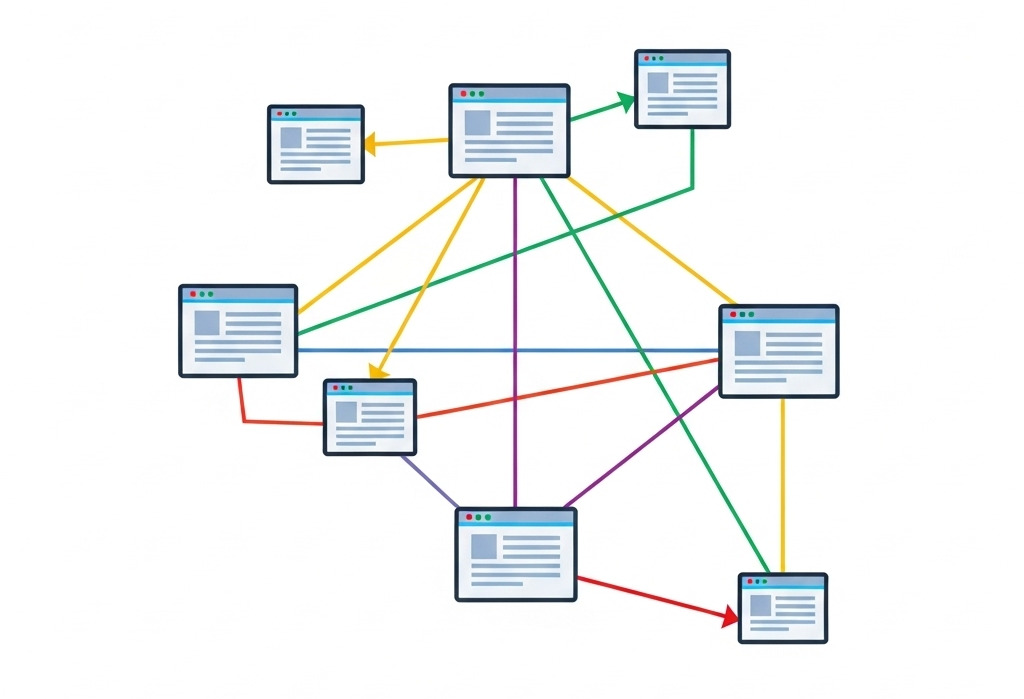Search engines no longer rely solely on keywords – they interpret meaning. At the centre of this shift is entity-based SEO, a method that helps Google connect the dots between concepts, people, places, and brands.
It’s a smarter way to optimise content for how search engines process relationships and context. The more clearly your content defines these connections, the more visible your brand becomes.
Table of Contents
Key Takeaways
- Entity-based SEO optimises content around real-world entities, enhancing relevance and context.
- Structured data helps search engines identify entities, boosting visibility in rich results.
- Internal linking connects related content, improving contextual relevance and crawlability.
- Aligning with known entities signals credibility and increases trustworthiness in search.
- In-depth content builds authority through strong topic coverage, ensuring comprehensive exploration of key subjects.
- Optimising for context uses related terms to improve search engine understanding.
- Earning mentions from authoritative sources strengthens credibility and authority.
What is an ‘Entity’ in SEO & Entity-Based SEO Meaning

In SEO, an entity refers to a specific, identifiable thing or concept that search engines can recognise and categorise independently. This could be a person, brand, place, event, product, or abstract idea.
They’re not tied to exact keywords, but rooted in meaning instead. When Google understands these entities and how they relate to each other, it can deliver more accurate and relevant search results.
Example of entities:
- Elon Musk – Person
- Tesla, Inc. – Organisation
- iPhone 15 – Product
- Digital marketing – Concept
- Paris – Location
Entity-Based SEO is structuring and optimising your content so that search engines can easily identify these entities and understand their relationships within your site and across the web.
It shifts the focus from keyword matching to building context, relevance, and authority around specific topics.
Difference Between Entity-Based SEO and Traditional SEO
While both approaches aim to improve search visibility, the way they operate is fundamentally different. Take a look at these core distinctions:
| Aspect | Traditional SEO | Entity-Based SEO |
| Focus | Exact-match keywords and backlinks | Meaning, relationships, and topic relevance |
| Content Strategy | Page-level optimisation targeting specific phrases | Contextual optimisation built around recognised entities |
| Search Engine Understanding | Based on keyword density and link signals | Based on semantic connections and knowledge graph optimisation associations |
| Ranking Stability | May fluctuate with algorithm changes focused on spam or keyword abuse | More resilient as it aligns with how Google understands real-world concepts |
| Goal | Improve rankings for specific search terms | Build long-term topical authority across related queries |
| Example | A coffee blog repeatedly targets the phrase “best coffee machine under RM500” on one page | The same blog ensures Google understands it as an authority on “coffee equipment,” “espresso machines,” “brewing methods,” and “kitchen appliances” by connecting content across multiple relevant entities |
Why Entity-Based SEO Matters
Search engines are evolving to understand content the way humans do by recognising the relationships between things. Here’s why this shift makes entity-based SEO essential:
- Enhances relevance in search results by helping Google understand what your content is about, not just what it says.
- Improves visibility across semantically related keywords, increasing your chances of ranking for a broader range of queries.
- Builds topical authority, positioning your site as a trusted source within a subject area.
- Supports entity-based voice search optimisation and query understanding, which rely heavily on entity recognition.
- Increases chances of appearing in rich results like featured snippets, knowledge panels, and “People Also Ask” boxes.
- Strengthens long-term ranking stability by aligning with how Google’s AI interprets meaning and relationships.
6 Ways on How to Apply Entity-Based SEO
Turning entity-based strategy into action starts with understanding how to structure and present your content meaningfully:
1. Use Structured Data Markup

Structured data or schema markup helps search engines understand the entities in SEO on your page by tagging them with clear labels like “Person,” “Product,” or “Organisation.” It increases your chances of appearing in rich snippets and enhances overall content clarity.
Using schema.org markup, you can highlight key information such as names, reviews, prices, and events so Google connects your content to the right topics in its Knowledge Graph.
2. Build a Strong Internal Linking Strategy

Link related pages together using direct anchor text that reflects the underlying entity or topic. For example, connect a blog on “espresso machines” to your product page about “home coffee makers.”
This makes it easier for users to navigate your site and signals search engines how your content is aligned with semantic search principles. Create topic clusters to strengthen your entity authority around key subjects.
3. Align Content with Known Entities (Wikipedia, Wikidata, Google Knowledge Graph)

Reference established entities from sources like Wikipedia or Wikidata, and use consistent terminology that matches how they appear in Google’s Knowledge Graph.
Linking to or mentioning these entities strengthens relevance and increases your chances of being associated with trusted topics.
4. Create In-Depth Topical Content
Focus on covering a topic comprehensively by addressing all relevant subtopics and answering common questions. Break down complex subjects into detailed sections using clear headings and natural language to enhance readability.
This method improves user experience and signals search engines that your content is authoritative and valuable within the specific topic or entity.
5. Optimise for Context, Not Just Keywords

Incorporate related terms, synonyms, and natural phrasing throughout your content to create a broader context. Address different aspects of the entity such as its background, uses, and implications rather than just focusing on exact keywords.
By doing so, it enables search engines to grasp the whole intent behind your content better, leading to improved relevance in search results.
Want to learn more about SEO writing tips? Check out this guide on how to optimise your content for better context and keywords rankings.
6. Earn Mentions from Authoritative Sources

Seek mentions and backlinks from high-authority websites relevant to your niche. These references strengthen your content’s credibility and signal to search engines that your site is associated with trusted entities.
Cultivating connections with reputable sources amplifies your online presence and supports long-term SEO success.
Conclusion
Entity-based SEO shifts the focus from keywords to meaning, helping search engines understand the connections between topics and entities.
Its implementation enhances content relevance, boosts authority, and improves visibility, ensuring long-term success in a rapidly evolving search environment.
Ready to optimise your content for the future of SEO? Let Newnormz digital marketing connect your brand with the right entities, build topical authority, and future-proof your rankings. Contact Newnormz today to get started!






